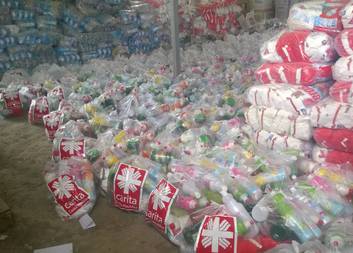Due to repeated clashes with the radical terrorist organization Islamic State (IS), Iraq now suffers from major internal displacement. Since the beginning of the conflict in 2014, 1.8 million people have left their homes. The Iraqi Kurdistan region now accommodates 90,564 families, 47% of which are displaced residents who have settled in only three of the region’s districts (Dohuk, Al-Shekhan and Akre). In the area of northern Iraq, 222,000 refugees from war-stricken Syria also continue to seek refuge.
In light of these circumstances, Caritas Czech Republic in collaboration with its partner Un Ponte Per, is committed to supporting internally displaced families in Iraq. Caritas provides the families with medical care, food and non-food packages containing household items, sanitary necessities and, more recently, children’s school supplies. The support provided by Caritas is aimed at families who live in unfinished buildings, in villages or in public spaces (churches, halls, jointly rented houses, etc.)
In the case of food packages, families in need will receive tea, lentils, rice, bulgur, tomato paste, sunflower oil, meat and other canned goods such as sugar, jam, pasta and salt. Hygiene kits contain soap, toothbrushes and toothpaste, dishwashing liquid, detergent, feminine hygiene products, shampoo, combs, small towels, body lotion and more. Households also appreciate blankets, stoves, kitchen sets and children’s clothing supplied by Caritas.
Besides material help, the refugees are also provided with medical care. Doctors in the region typically treat patients with diabetes, high blood pressure, high cholesterol, asthma, blood clots, ulcerative colitis (i.e. chronic inflammatory bowel disease), and epilepsy or thyroid problems. For these and many other illnesses, medication is also provided.
The ‘mobile unit’ represents a supportive role in this capacity. Using a minibus to travel around the entire area, the unit surveys the needs of refugees and organises training sessions. The unit disseminates information regarding health and hygiene, child protection and the availability of humanitarian assistance. Each crew transports the necessary materials as well as beverages and cookies for children in remote areas. For those in need, two help hotlines are also available in case of emergency.
Caritas plans to support the displaced families in the region until at least the end of 2015. This being said, Caritas is already working on follow-up activities and looking for ways to finance them.
Thanks to the renowned fund-raising platform supplied by Caritas, any interested member of the public may also contribute to the relief efforts.







